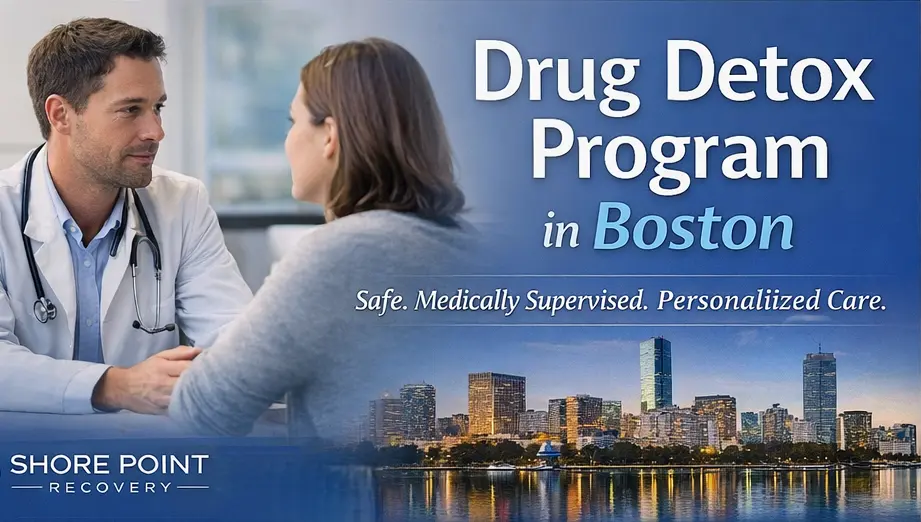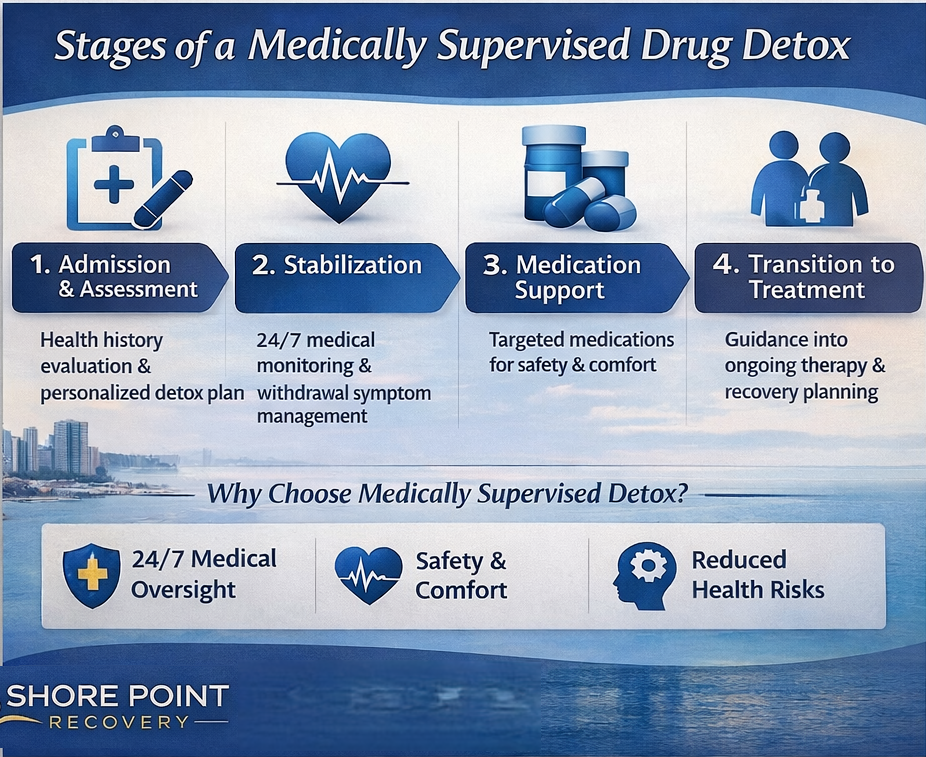Drug Detox Program
Drug Detox Program in Boston
-
 Written By:
Shore Point Team
Written By:
Shore Point Team
-
 Edited By:
Shore Point Team
Edited By:
Shore Point Team
-
 Clinically Reviewed By:
Erin Andrade, LICSW
Clinically Reviewed By:
Erin Andrade, LICSW
Summary: Shore Point Recovery’s medically guided detox offers safe, discreet, and compassionate acute treatment. With 24/7 clinical oversight, withdrawal is carefully managed to restore stability, protect health, and prepare the body and mind for lasting recovery.
Table of Contents

The First Step Toward a Medically Supervised Drug Detox Program
In the United States, more than 100,000 lives were lost to drug overdoses in 2023, a number that has more than doubled in the past decade. Opioids remain the leading driver of these fatalities, but prescription medications, stimulants, and other illicit substances contribute to a crisis that reaches into every community and profession. The impact is not always visible; behind steady careers and composed appearances, the physical and psychological toll of substance dependence can be profound.
At Shore Point Recovery, our elevated acute treatment services (ATS) are carefully curated to restore stability with precision, discretion, and dignity. Guided by elite medical leadership, each client is met with 24/7 clinical oversight, thoughtful medication management, and attentive support that addresses both the physical and emotional demands of withdrawal. Comfort is not an afterthought; it is built into every detail, from the therapeutic environment to the personalized pace of care.
When detox is managed with the highest clinical standards, every subsequent phase of treatment becomes more effective. This is where clarity begins to return, where the body regains strength, and where the mind becomes ready to engage in the transformative work ahead. In a setting that blends the credibility of elite medical leadership with the refinement of boutique wellness, Shore Point Recovery offers a foundation for lasting change.
The Critical Difference of a Medically Guided Drug Detox Program
Ending substance use is not a single act of will; it is a precise, carefully managed transition that allows the body to safely adjust after dependency. The experience of withdrawal is different for every substance.
- Opioid discontinuation can bring relentless discomfort and dangerous fluid loss.
- Benzodiazepines, if stopped abruptly, may trigger seizures or life-threatening confusion.
- Stimulant withdrawal often comes with severe psychological lows, while prescription drug withdrawal can blend multiple risk factors, making outcomes harder to predict.
In the absence of professional oversight, these symptoms can escalate with alarming speed. Seizures, heart complications, extreme dehydration, and acute mental health crises are not theoretical risks; they are well-documented medical emergencies. The idea that forcing the body through withdrawal without help is somehow “faster” or “cleaner” ignores the reality: unmanaged detox can result in lasting harm or even be fatal.
Shore Point Recovery’s acute treatment services (ATS) provide a measured, medically sophisticated alternative to unsafe self-detox. Under the constant attention of experienced physicians and licensed clinicians, each step is monitored, every symptom addressed, and every intervention tailored to the individual. The process is not rushed; it is calibrated, allowing withdrawal to unfold with safety, comfort, and discretion. This is the secure threshold to recovery, where stability is not left to chance, and the body and mind are prepared for the deeper work ahead.
What to Expect During Drug Withdrawal
Withdrawal is the body’s process of restoring equilibrium after dependence. The intensity and nature of symptoms depend on the substance involved, dosage, duration, co-occurring conditions, and whether multiple substances are used together. Different drug classes affect the brain and body in distinct ways, and as the drug’s influence fades, the body responds in ways that can range from uncomfortable to life-threatening.
Substance Class | Underlying Response | Typical Withdrawal Pattern |
Opioids (including synthetic opioids) | CNS rebound with intense autonomic activation | Restlessness, muscle aches, gastrointestinal distress, insomnia, strong cravings |
Benzodiazepines | CNS rebound with high seizure risk | Heightened anxiety, irritability, tremors, sensory hypersensitivity, possible seizures |
Barbiturates & Sedative-Hypnotics | Rapid CNS rebound due to abrupt removal of sedative effect | Agitation, confusion, tremors, seizures, cardiovascular instability |
Stimulants | Neurochemical depletion from abrupt loss of elevated dopamine/norepinephrine | Fatigue, low mood, irritability, disrupted sleep, cravings |
Prescription Sleep Aids (e.g., zolpidem) | CNS rebound affecting sleep-wake regulation | Anxiety, insomnia, tremors, in rare cases seizures |
Withdrawal Can Be a Medical Emergency
Some substances, particularly benzodiazepines and barbiturates, can trigger life-threatening complications if stopped suddenly. Seizures, severe cardiovascular changes, and delirium are medical crises, not passing discomfort. Attempting to withdraw without professional supervision can place both immediate safety and long-term health at risk.
At Shore Point Recovery, Acute Treatment Services (ATS) are designed to anticipate and manage these physiological shifts with discretion and expertise. Continuous monitoring, targeted interventions, and a tailored pace of care ensure that stabilization is achieved safely and comfortably, creating the foundation for deeper, lasting recovery.
Drug Detox at Shore Point Recovery
The first step is often the most delicate. At Shore Point Recovery, admission into drug detox, a clinician greets you directly, reviews what’s needed, and answers the questions that matter most in that moment. It’s quiet, measured, and handled without delay. Whether you arrive on your own or with a trusted representative, the process is discreet from start to finish.

Once here, your care plan begins the same day. A physician meets with you to understand your health history, the substances involved, and any co-occurring conditions. Our clinical team remains at your side around the clock, adjusting protocols as symptoms shift. Each plan is built to address the specifics of your withdrawal, not only the drug type and dosage, but how your body responds in real time.
Thoughtful, Targeted Medication Support
When medication is appropriate, it is selected to match the specific withdrawal profile of the substance or substances in question. Each choice is deliberate—designed to minimize discomfort, safeguard health, and support the body’s transition back to balance.
When medication is needed, it’s used deliberately, chosen for its ability to stabilize the nervous system, ease acute discomfort, or prevent complications.
Benzodiazepines Calm the nervous system, prevent seizures in depressant withdrawal | Anticonvulsants Reduce seizure risk in benzodiazepine or sedative withdrawal |
Clonidine or similar agents Lessen opioid withdrawal symptoms such as sweating, anxiety, and rapid heart rate | Beta-blockers Manage elevated heart rate and blood pressure |
Anti-nausea medications Relieve gastrointestinal distress | Non-addictive sleep aids Support rest and recovery during insomnia |
Your accommodations are private and quiet. Meals are prepared to restore energy and hydration. If you feel well enough, gentle therapies — a guided meditation, a light massage — can be integrated to ease tension and help the body settle.
This is how drug detox begins here: with steady medical oversight, the right interventions at the right time, and an environment that lets you focus on one thing — getting through the hardest part, safely.
Stability Starts with a Professional Drug Detox Program
Drug detox is where stability returns, where safety is restored, and where the mind begins to clear for the work ahead. At Shore Point Recovery, every detail, from the medical oversight to the quiet comfort of the environment, is designed to carry you through this pivotal first stage with dignity, discretion, and care. It is more than the start of treatment; it is the moment you gain the secure footing needed to move forward into lasting recovery.
FAQs about Drug Detox
What is drug detox and why is it important?
How long does drug detox typically take?
Who should consider medically supervised detox?
Is drug detox safe?
Can I detox at home safely?
What happens after detox is complete?
Table of Contents
Most Insurance Policies
Cover Treatment.
"*" indicates required fields
About The Contributors

Erin Andrade, LICSW
Program Director

Shore Point Team
Team Member

Shore Point Team
Team Member


